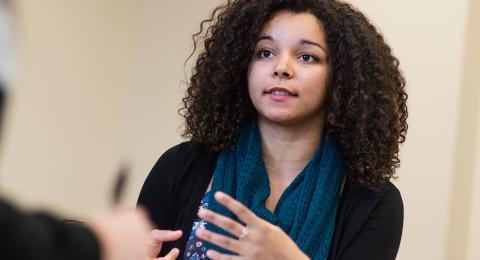The five-year accelerated B.A./M.A. psychology degree program is for current UNH undergraduate majors who wish to gain extensive research experience as behavioral scientists in preparation for entrance into doctoral programs in psychology. Advance and further specialize your psychology education in only one additional year at UNH. Prospective students typically are already working in laboratories with UNH faculty and propose and defend a master’s thesis to complete their degree.
Master’s students also take the following courses/requirements:
The graduate statistics sequence:
PSYC 805 Research Methodology & Statistics I
PSYC 806 Research Methodology & Statistics II
PSYC 907 Research Methodology & Statistics II
Your choice of at least two graduate seminars
8 credits of PSYC 894 or 899 (Thesis Research)
A minimum of 30 credits combined (and students use 12 graduate credits toward their undergraduate degree as electives in their 4th year)
You will develop a broad knowledge of psychology and perform research in one of three areas of specialization: brain, behavior and cognition; social/personality; and developmental psychology. This master’s degree is only available to current UNH undergraduate students. Please contact faculty in our department who have research laboratories prior to your 4th year at UNH to explore the possibilities of working on an accelerated master’s degree. After a faculty member has agreed to work The MA program is an experimental program and does not provide direct training in counseling or clinical psychology.
Why get a master’s degree in psychology?
The five-year accelerated B.A./M.A. psychology degree program is for UNH undergraduate psychology majors who wish to gain extensive research experience as behavioral scientists in preparation for doctoral programs in psychology or applied psychology careers. You’ll develop a broad knowledge of psychology and perform research in one of three areas of specialization: brain, behavior and cognition; social/personality; and developmental psychology. Advance and further specialize your psychology education in only one additional year at UNH. This master’s degree is only available to UNH undergraduate students.
Why choose UNH for your psychology degree?
As a student in the psychology master’s degree program, you’ll work closely with experienced faculty while conducting research. There are active research laboratories in all areas of the graduate program and the department has strong partnerships with such nationally recognized programs as UNH’s Child Study and Development Center and the Family Research Lab. Our graduate psychology program has been recognized by the American Psychological Association for Innovation in Graduate Education in Psychology.
Potential career areas
- Doctoral program admission
- University or industrial research
Curriculum & Requirements
The M.A. Psychology is only available as part of the accelerated B.A./M.A. program and thus not open for admission to students outside of UNH.
The Department of Psychology offers an accelerated B.A to M.A in experimental psychology that can be accomplished in a total of 5 years. The basic goal of the program is the development of behavioral scientists who have a broad knowledge of psychology and can carry out sound research in an area of specialization. Although some students seek employment outside academia, the program is oriented toward developing the skills required by the research psychologist who intends to seek admission to a non-clinical Ph.D. program. Students who wish to apply to this program should submit a complete graduate application to the graduate school during the fall or spring of the student's third year. As well, they should arrange to work with a particular faculty member who will serve as a preceptor for the Paper of Publishable Quality - Thesis project.
Areas in which the student may specialize are brain, behavior and cognition; developmental psychology; or social psychology/personality. The department does not offer training in clinical or counseling psychology.
The first step toward applying to the program is to contact a faculty member whose research is in a topic that matches your interest in order to arrange support for your thesis or paper of publishable quality. Interested students must submit a full graduate application to the graduate school during their junior year.
For additional information, please contact the department at 603-862-2360 or at psyc-grad.admission@unh.edu.
Degree Requirements
The M.A. requires a minimum of 30 graduate credits.
| Code | Title | Credits |
|---|---|---|
| Required Courses | ||
| PSYC 805 | Research Methodology and Statistics I | 4 |
| PSYC 806 | Research Methodology and Statistics II | 4 |
| PSYC 907 | Research Methods and Statistics III | 4 |
| PSYC 894 | Paper of Publishable Quality (PPQ) 1 | 8 |
| or PSYC 899 | Master's Thesis | |
| A minimum of two Psychology advanced seminars | 8 | |
| Elective Courses | ||
- 1
Most students complete the master’s research project in the form of a PPQ. Those selecting the thesis option should note that the thesis deadlines for the final oral and submission of the final thesis copy are about three weeks earlier than the deadlines for the PPQ option.
The accelerated B.A. to M.A. program in experimental psychology aims to
- Improve opportunities for excellent undergraduates to prepare for competitive Ph.D. programs or add an additional credential before entering a competitive job market; and
- Allow students interested in experimental psychology to advance and further specialize their psychology education in only one additional year at UNH.
The MA requires 30 credits. Twelve credits will count towards both the BA and MA degree. This coursework counts as electives and does not count towards the core requirements for the undergraduate psychology major. Students must fulfill all programmatic requirements for the master's degree program, as well as fulfill all programmatic requirements for their bachelor's degree.
A total of 30 graduate credits to include:
| Code | Title | Credits |
|---|---|---|
| PSYC 805 | Research Methodology and Statistics I | 4 |
| PSYC 806 | Research Methodology and Statistics II | 4 |
| PSYC 907 | Research Methods and Statistics III | 4 |
| PSYC 894 | Paper of Publishable Quality (PPQ) | 8 |
| or PSYC 899 | Master's Thesis | |
| A minimum of two Psychology advanced seminars | 8 | |
Note: Most students complete the master’s research project in the form of a PPQ. Those selecting the thesis option should note that the thesis deadlines for the final oral and submission of the final thesis copy are about three weeks earlier than the deadlines for the PPQ option
Example BA/MA Five-year program sequence:
32 credits total in this example.
Only 30 credits are required.
12 credits of the MA (PSYC 805 Research Methodology and Statistics I, PSYC 806 Research Methodology and Statistics II, Advanced Seminar) will also count as elective credits towards the BA.
| Fourth Year | ||
|---|---|---|
| Fall | Credits | |
| PSYC 805 | Research Methodology and Statistics I | 4 |
| Advanced Seminar | 4 | |
| Undergraduate course | ||
| Undergraduate course | ||
| Credits | 8 | |
| Spring | ||
| PSYC 806 | Research Methodology and Statistics II | 4 |
| Undergraduate course | ||
| Undergraduate course | ||
| Undergraduate course | ||
| Credits | 4 | |
| Fifth Year | ||
| Fall | ||
| PSYC 907 | Research Methods and Statistics III | 4 |
| PSYC 894 or PSYC 899 | Paper of Publishable Quality (PPQ) or Master's Thesis | 4 |
| Advanced Seminar | 4 | |
| Credits | 12 | |
| Spring | ||
| Advanced seminar | 4 | |
| PSYC 899 or PSYC 894 | Master's Thesis or Paper of Publishable Quality (PPQ) | 4 |
| Credits | 8 | |
| Total Credits | 32 | |
Program Learning Outcomes
- Have a mastery of the field of psychology sufficient to teach introductory courses in psychology.
- Demonstrate an understanding of statistics and research design, and the ability to evaluate the quality and implications of scientific research by completing a research project (supervised by a faculty member).
- Write empirical research reports and literature reviews in American Psychological Association style.
- Demonstrate competence in oral communication and understanding of scholarly research by giving a conference style presentation.
- Assessment: Each student presents an oral defense of their Masters Thesis or paper of publishable quality.
Deadlines
Applications must be completed by the following deadlines in order to be reviewed for admission:
- Fall: July 1 (only UNH juniors or seniors applying as accelerated masters students are eligible to apply to this program)
- Spring: N/A
- Summer: N/A
- Special: N/A
Application fee: $65
Campus: Durham
New England Regional: No
Accelerated Masters: Yes (for more details see the accelerated masters information page)
New Hampshire Residents
Students claiming in-state residency must also submit a Proof of Residence Form. This form is not required to complete your application, but you will need to submit it after you are offered admission, or you will not be able to register for classes.
Transcripts
If you attended UNH or Granite State College (GSC) after September 1, 1991, and have indicated so on your online application, we will retrieve your transcript internally; this includes UNH-Durham, UNH-Manchester, UNH Non-Degree work and GSC.
If you did not attend UNH, or attended prior to September 1, 1991, then you must upload a copy (PDF) of your transcript in the application form. International transcripts must be translated into English.
If admitted, you must then request an official transcript be sent directly to our office from the Registrar's Office of each college/university attended. We accept transcripts both electronically and in hard copy:
- Electronic Transcripts: Please have your institution send the transcript directly to grad.school@unh.edu. Please note that we can only accept copies sent directly from the institution.
- Paper Transcripts: Please send hard copies of transcripts to: UNH Graduate School, Thompson Hall- 105 Main Street, Durham, NH 03824. You may request transcripts be sent to us directly from the institution or you may send them yourself as long as they remain sealed in the original university envelope.
Transcripts from all previous post-secondary institutions must be submitted and applicants must disclose any previous academic or disciplinary sanctions that resulted in their temporary or permanent separation from a previous post-secondary institution. If it is found that previous academic or disciplinary separations were not disclosed, applicants may face denial and admitted students may face dismissal from their academic program.
Letters of Recommendation: 2 Required
Recommendation letters submitted by relatives or friends, as well as letters older than one year, will not be accepted.
GRE Optional But Recommended
The GRE scores are optional, though strongly recommended. If you wish to provide scores please email the scores directly to the department once you have submitted your application online.
Personal Statement/Essay Questions
Prepare a brief but careful statement regarding:
- Reasons you wish to do graduate work in this field, including your immediate and long-range objectives.
- Your specific research or professional interest and experiences in this field.
Important Notes
All applicants are encouraged to contact programs directly to discuss program-specific application questions.
Additional Department Requirements
Interview Required; applicant must communicate with preceptor prior to applying.
The Master’s in Psychology will ONLY be available for application by current UNH undergrads to the Accelerated Master’s program. Non-UNH applicants are ineligible.
International Applicants
Prospective international students are required to submit TOEFL, IELTS, or equivalent examination scores. English Language Exams may be waived if English is your first language. If you wish to request a waiver, then please visit our Test Scores webpage for more information.
Explore Program Details
The Brain, Behavior, and Cognition program offers a multidisciplinary approach to the study of cognition and brain function. Its aim is to provide students with the theoretical and methodological skills necessary to conduct independent research and to become productive scholars and teachers in this area. Mentorship comes from nine faculty members in Psychology, and can be enhanced by collaboration with faculty from other departments such as Animal and Nutritional Sciences, Biochemistry and Molecular Biology, Linguistics, and Zoology. The faculty in Brain, Behavior, and Cognition offers a wide range of knowledge and experience analyzing behavior and applying the techniques of traditional experimental psychology, psychophysics, and modern neuroscience to the study of related cognitive, perceptual, biological and neurological mechanisms.
Most graduate students work on research projects that are part of a faculty member's on-going research, but students are encouraged to develop independent lines of research. Currently, faculty members have interests in basic memory processes; reading comprehension; psycholinguistics; language development; physiological mechanisms that underlie certain memory, stress, and mood disorders; psychopharmacology; psychoneuroimmunology; animal learning and behavior; comparative psychology; basic visual processes including spatial and temporal properties of stereopsis illusions, color vision, and physiological optics.
Animal labs include a variety of computer-controlled apparatus for training diverse behavioral tasks. These include a Morris water maze, video tracking system for open field, automated radial arm mazes, swim stress apparatus, chambers for olfactory discrimination and memory, rodent operant chambers for training DM and DNM with retractable levers, avian operant chambers with video displays and touchscreens, serial reaction task chambers, and shuttle boxes. Additional behavioral apparatus include measures of motor function, analgesia, behavioral despair, and fear conditioning. The labs are well-equipped for stereotaxic surgery, histology, light-microscopy and image analysis, intracranial infusion of drugs, neurochemistry and receptor binding studies, assessment of immune function, and stress-controllability programs.
Vision labs are equipped with a four-channel xenon-arc-based Maxwellian view optical system, a computer-based stereo Maxwellian view optical system, and a two-channel rear projection free-view optical system.
Cognitive labs consist of state-of-the-art computers and associated equipment, including eye-tracking technology. The cognitive neuroscience laboratory is equipped with a 64-channel ActiChamp EEG system.
The Developmental Psychology program offers graduate students the opportunity to study social, emotional, cognitive and neuropsychological aspects of human development. Coursework and research in the department touches on development from infancy through old age, and encompasses both theoretical and applied perspectives. Students emerge from the program with a broad knowledge base in developmental psychology and familiarity with diverse methodologies.
Current faculty research interests include cultural and media influences on development, parenting, sexuality, social support and memory development.
The Social/Personality psychology program provides opportunities for graduate students to do research on many topics. Some graduate students work on research problems that are closely related to ongoing faculty research programs, while others develop their own research interests. Students draw on the expertise of the faculty in Developmental, Cognitive and other areas of psychology within the department, and with faculty in other departments such as Sociology, in addition to the faculty whose primary identification is with Social/Personality Psychology.







